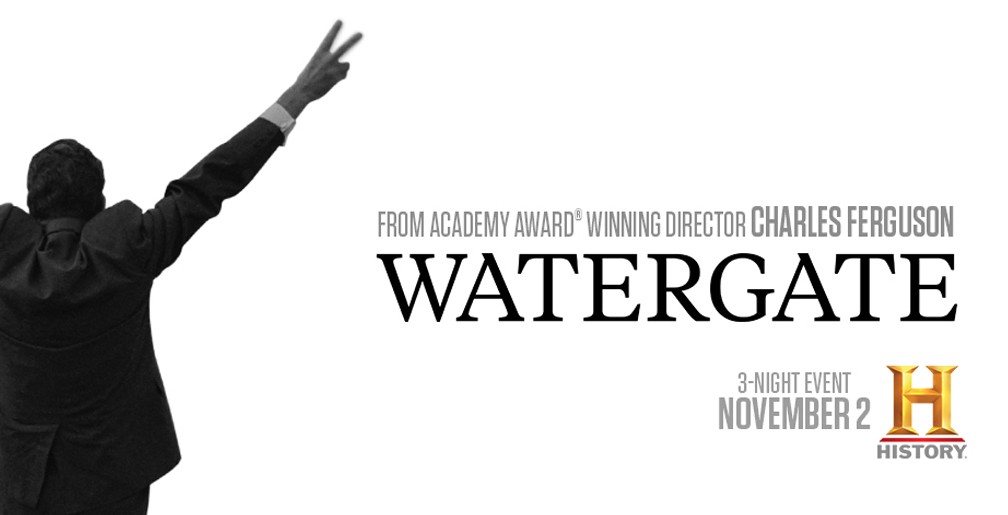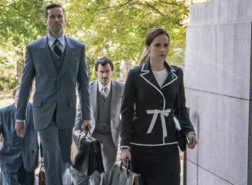 (5 / 5)
(5 / 5)
This special six-hour, three-night event series chronicles one of the biggest criminal conspiracies in modern politics and features a roster of some of the most important media, legal and political figures from the scandal, including Carl Bernstein, Bob Woodward, John Dean, Jill Wine-Banks, Richard Ben-Veniste, and many others.
An old story updated, delivered in a concise, engaging manner, “Watergate” makes its television premiere November 2-4 on the History Channel. This documentary marks another superb effort by the gifted Charles Ferguson, who has become the preeminent chronicler of complex historical moments. The director’s knack for making cryptic issues accessible and interesting continues in an unparalleled fashion with this latest offering. His 2010 Oscar-winning documentary “Inside Job” remains the finest examination of the 2008 financial meltdown and its aftermath yet produced.
Whereas “All The President’s Men” ends with Bob Woodward and Carl Bernstein frantically typing up stories for the Washington Post as Richard Nixon’s televised second inauguration in 1973 airs live in the background, “Watergate” chronicles events right up to the present.
The film opens with the backdrop that led to Nixon’s election as president. Nationwide disillusionment and dissatisfaction with Democrats – particularly Lyndon Johnson – over continued U.S. involvement in the Vietnam War, left the party divided. George Wallace’s independent run splintered Democratic voters even further, virtually assuring Nixon’s ascension to the presidency.
After his election and despite campaign promises to the contrary, Nixon actually intensified the war in Vietnam by expanding military action into Cambodia. Escalation of the war spurred the wrath of the growing antiwar sentiment, and that antipathy toward the administration triggered Nixon’s dark side.
Nixon also displayed an irrational fear of East Coast Ivy-league elites and the media, both of whom he believed had cheated him out of past elections. After losing the presidential race in 1960 to blue blood, Harvard-educated John Kennedy, Nixon then lost the race for California Governor two years later. Claiming that the media favored his opponent Pat Brown, he uttered one of his famous lines about the press not having Dick Nixon to kick around anymore, as he announced his retirement from politics (though clearly, he changed his mind).
Growing public sentiment against the war resulted in two million demonstrators descending on Washington in 1969 – Vietnam Memorial Day. Yet, Nixon and National Security Adviser Henry Kissinger stubbornly pressed ahead anyway, despite staff advice to the contrary. It became obvious that administration policy was driven not by the welfare of South Vietnam, but rather by the interest of American prestige.

Pressure on Nixon and Kissinger intensified with the release of the Pentagon Papers by Daniel Ellsberg, a former analyst for Kissinger. The papers plainly showed that U.S. officials had known for some time the Vietnam War could not be won. Controversial as the papers may have been, they were hardly a revelation to many, even at the time. The French could have easily pointed out their own intractable difficulties in Indochina prior to U.S. involvement, just as years later the British (or even the Russians) might have recommended circumspection regarding Afghanistan.
Ferguson uses the Nixon White House tapes to reenact meetings for the film most effectively. Due to the poor quality of the original recordings, he employs actors for key segments. This approach brings the account into sharper focus than ever before, and the content of the tapes is truly shocking.
Eyewitness explanations reinforce the dialog captured on tape. According to Morton Halperin, who worked for Kissinger as director of policy planning for the National Security Council, Nixon was prone to irrational rants. Perhaps most disconcerting, the tapes demonstrate that Nixon drove the illegal activity before and after Watergate. As far back as July 1971, nearly a year before the Watergate break-in, Nixon explicitly authorized chief of staff H.R. Haldeman – with Kissinger present during the discussion – to use any means necessary in order to infiltrate the opposition. He subsequently ordered Haldeman to steal research from Brookings Institution vaults. Administration officials even considered firebombing Brookings as a diversion to break into the facility.
Both Henry Kissinger, as well as Donald Segretti, who ran Nixon’s dirty tricks operations, declined requests for interviews. Happily, this roll call for “Watergate” is much shorter than the parade of enablers from the 2008 financial crisis that refused to take questions for “Inside Job” – a list comprised of prominent figures such as Larry Summers, Alan Greenspan, Robert Rubin, Lloyd Blankfein, Ben Bernanke, and Henry Paulson.
The production of “Watergate” marks a unique epoch. The window of opportunity to interview the principals continues to shrink. Those still alive include Daniel Ellsberg (now 87), Connecticut Senator and Governor Lowell Weicker (87), New York Congresswoman Elizabeth Holtzman (77), California Congressional Representative Pete McCloskey (91), William Ruckelshaus (86), Dan Rather (86), Morton Halperin (80), and others – not least of which are Carl Bernstein (74) and Bob Woodward (75). In addition, enough time has lapsed so that key players in their twilight years presumably have little to risk from candor.
Much the way Robert McNamara was so forthcoming in the magnificent “The Fog of War,” so too are the subjects that Ferguson interviews. Of course, that’s not to say individuals don’t try to put their own spin on things, but with so many knowledgeable people willing to weigh in, a robust historical picture invariably emerges.

Ferguson occasionally takes a few deserving swipes at participants in his documentaries. Near the end of “Inside Job,” there is a delightful scene where Ferguson asks Glenn Hubbard, dean of Columbia’s Graduate School of Business and former chair for George W. Bush’s Council of Economic Advisors, about his outside remuneration as a consultant. The topic is relevant because of potential conflicts of interest between academic economists driving public policy decisions on the one hand, and their paid work in the financial industry on the other. At that point, a flummoxed Hubbard becomes highly defensive and essentially ends the interview, saying bluntly that it was a mistake to give Ferguson access to his office. “You have three minutes,” he says pedantically. “Give it your best shot.”
In the same vein, Ferguson has a little fun with John Dean in “Watergate” regarding the role he played criminalizing marijuana, though it would have been nice if he had gone further. It’s not apparent, for example, why Dan Rather, who has a few peccadilloes of his own didn’t get skewered a bit as well. Such omissions, however, remain minor quibbles.
Without question, “Watergate” has relevance to current events. As with the Nixon administration, scholars in our current era once again debate the legality of a president pardoning him or herself. In fact, the alternate title of “Watergate” tacked on to the closing credits reads: “How We Learned To Stop an Out Of Control President.”
This excellent documentary contains far too much material to capture adequately in a brief synopsis such as this. Suffice to say that the updated narrative is timely, captivating and thorough. Charles Ferguson’s “Watergate” may well prove to be the definitive look at how the democratic mechanisms of a free press, an independent judiciary, and an engaged citizenry saved the republic from the pervasive corruption of the Nixon presidency.
“Watergate” airs on the HISTORY Channel Friday, November 2nd














[…] TV Review: “Watergate” Conveys Fresh And Fascinating Historical Material With Searing Clarity […]